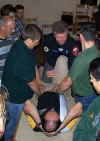
Wales, Part 3
Class goes well – we have the supervisor of medical training for the Royal Air Force mountain rescue teams, four U.S. Air Force pararescuemen ("PJs"), members of mountain and cave rescue teams from across the British Isles, a Royal Army medic, a Canadian doctor, an English cave rescue doctor, and many other students with interesting backgrounds.
It’s continuing to drizzle, classic Welsh weather. As John Evans, a noted climber and Welsh mountain rescue team member, and a class instructor, says: "In Wales, we don’t have climate, we just have weather. Lots of it. As they say, if you can see the hills, it’s going to rain, and if you can’t see the hills, it’s raining."
Emily is assigned the Wilderness Medical Problems section to teach later on in the week, and combines studying for her boards along with preparing the lecture. She works very hard on this, and everyone stays away from her!

The day dawns clear and fine – a special Welsh present for our class. Not a cloud in the sky.
The students are loosening up, and getting into the swing of things. Class goes well, with a lot of student interaction and good questions. Unlike previous classes, no major computer problems – a few laptops crash and have to be rebooted, but not during any actual presentations. And unlike previous classes, the LCD projector hasn’t exploded yet. Practical sessions in the evening go well – I demonstrate hip and shoulder dislocation reduction, and then we have clinical scenarios outside for a couple of hours.


Weather’s still fine – cool, clear, almost cloudless.
Jel presents the pharmacology lecture – good thing as none of us Americans are that good with the different names of the drugs here. (pethidine=Demerol, paracetamol=Tylenol, Stemetil=Compazine, xylometazoline=Afrin, for examples.)
Jack and I give a demonstration of radio reporting, and then Emily’s up for
her 4 hours of lecture.

Emily does an outstanding job with Wilderness Medical Problems – a great presentation of common medical problems at a level the student can understand, but with summaries of the important implications of the recent literature.
In the evening, we have some exercises in the field – they go one until
after dusk which is about 5 PM at this high latitude. The exercises go pretty
well – students do considerably better than during the first set of exercises
yesterday. The evening is almost perfect as the sun sets over the hills and the
starts come out., Jel tells everyone over the radio net that it’s time to head
back to camp, but several teams say they’d rather stay out on the hills.

After class is over, much of the class heads to the Penhelig Arms again, a pleasant night walk, about a mile along the shore of the estuary. The tide’s coming in, so we will have to walk back via the road – we’ve got headights, which helps along the path as well as for better visibility along the road on the way back, as there’s no sidewalk nor even much room for two cars to pass along the winding road. At the pub, Eric from Scotland pulls out his fiddle, and we stay several hours with much singing and general good cheer ("good crack" in British English). People try to persuade Jel to show how he can do Irish dancing in Wellies (big rubber Wellington boots) but as we only have yellow ones instead of the proper kind, he declines. However, he does provide a remarkable rendition of Waltzing Matilda, every single verse, in his impressive voice – and Emily provides a wonderful clear rendition of Summertime from Porgy and Bess, both of which obtain big rounds of applause.
Today we have more lectures. Jack’s lecture on Death and Dying is well
received, as is mine on Stress Management and Critical Incident Stress
Debriefing. In the afternoon, we have a visit from one of the RAF mountain
rescue team helicopters. In the evening, we have a more formal dinner – Eric
brings out his fiddle, and Tina (one of the class staff) brings her daughter in
for a round of Irish dancing.
I spend a lot of time with the physicians, discussing medical and political aspects of providing advanced medical care in mountain and cave rescue situations — part of the Wilderness Command Physician class. These physicians aren’t just doing the 2-day WCP class, they’re also taking the entire WEMT class and thus should be in good shape to provide care in the field.